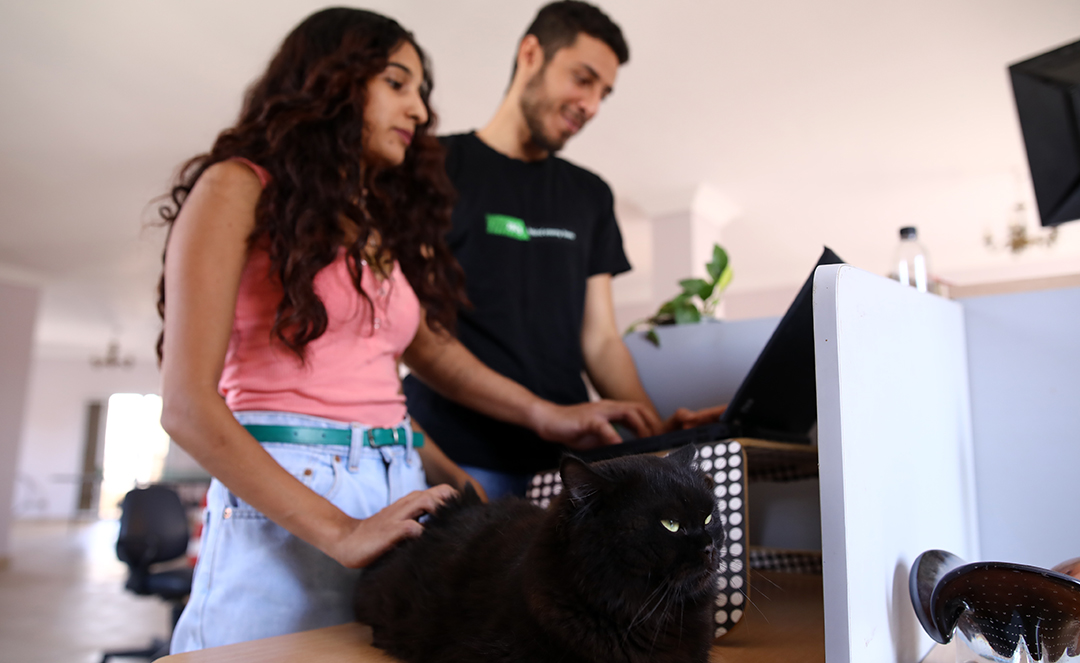This Egyptian Startup Is Not Your Typical Web Development Company
A decentralised tech commune at the outskirts of the capital, with a cat as the in-house consultant (slash therapist); Goya Sites is definitely a stranger to the Egyptian startup - let alone corporate - landscape.

“We’re your average bunch, you know, like your good old buddies,” Ebtessam Zoheir says as she introduces Goya Sites to Startup Scene. Zoheir and her co-founder, Mina Nagy, are both graduates of the same major: Computer Science. Each has had their flings in the corporate world, even with startups, but nothing clicked with them. So they gathered one night and decided to start Goya - which is not meant to be, but is somehow, an acronym for “Get Off YourAss.”
Located in a spacious apartment in the vast desert that is New Cairo, they are slowly furnishing it to become more comfortable. With a cubical set at a corner, Goya’s headquarters leans a bit further from the office stereotype and more towards hipster. What inspired them is that they were all already in the web and software development business but working on a freelance basis. So, they thought why not group up and call themselves a name?
“We saw the opportunity in the demand of this product; it all started with our partner’s father who wanted a website, so we developed it for him,” Nagy tells Startup Scene. “Then we decided to build a structure to organise our relationship with clients instead of reinventing the process with each client who approaches us,” Zoheir says, completing Nagy’s sentence.

"We don’t want investors; we want to try out completely organic growth."
Their idea evolved bit by bit as they got into a decentralised social network. "We got introduced to lots of concepts and people adopting different lifestyles, such as tech communes and boats; some people in New Zealand, for instance, live on a boat, but they work on tech. They’re software engineers, just like us," says Zoheir.
Right after the French Revolution, activists got inspired to form communes in France, Italy, and some parts of Germany to establish their own ideological grounds. The word tech commune was first coined in San Francisco around the year 2013, as young people grew tired of the corporate world which saw young employees slowly quit one after the other. The main motive behind Goya Sites' business model, that tilts towards that of a tech commune, is comfort and peace of mind.
"What really impressed us is that they do sort of the same thing we used to do in college, where we used to gather in a house and stay with each other to finish a particular project," Nagy says, as he remembers college days. "Now, it’s the company that is gathering the people and the team is expanding. I’m living here with another coworker. Goya Sites has evolved into both a living and working space."
Adding to her colleague's enthusiasm about the philosophy, Zoheir says that they find it very intriguing. "There are studies that found that tech communes provides some kind of solution to depression in the modern-day world," she says. "That’s probably because you’re working in a place where your coworkers are like a family to you, you are literally living together. And there are models like that that already exist in the world."
In Egypt, there could be a challenge dealing with both government and society. "We would probably face societal constraints, as tech communes would require girls to live in the same apartment with guys. That’s why that dream about working as a commune would be difficult to pursue in Egypt,” Zoheir adds. They are yet to see a tech commune in the Middle East. "If they exist they’re working extremely underground. Especially that the tech community is very corporate. Despite that, there is an emerging startup culture that is trying to make it less suits and tuxedos,” she says.
Going by the same theme, Goya Sites doesn't want investors. "We want to try out completely organic growth," Zoheir says, cueing Nagy to add that they want people to invest with their effort, not money. Zoheir agrees, arguing that they want to have the full control of their values and visions that might be deemed as “wacky” by investors. "Maybe our approach and ideas won’t exactly milk money," she says. "Yes, we want to be a sustainable business, we want to make money, live well and everything, but we still want other things in life. It’s not fully about greed, yes definitely money is important and we need money. But if we have an investor, we won’t be able to do everything our way.”
Goya Sites has a financial edge where they're claiming to provide the cheapest service with the best-looking designs. Currently, they offer 20 percent off for socially aware or environmentally friendly businesses as part of their values and philosophy. “If we have an investor, this might not work out.”

Google, Purina, and Zynga let their employees bring their pets because they believe they contribute a great deal to their state of mind and in turn affects their productivity.
But being a tech commune is not the only edge Goya enjoys; it also enjoys a cat. "He's called Cathulu, a name we coined after Cthulu the Lord of Darkness," Zoheir says. "He's our in-house consultant."
Even though ailurophobia is among the most common phobias in the world, cats are proven to have an effortless stress-relief effect on people. In fact, Ferray, the Japanese IT company has around nine cats roaming in their office to help their employees cope with fatigue and anxiety. Also many multinational innovation companies like Google, Purina, and Zynga let their employees bring their pets because they believe they contribute a great deal to their state of mind and in turn affects their productivity.
Cathulu is a middle-aged Persian feline who lost his path in the desert. He was once cat-walking down an alley close to Goya Sites' apartment only to have Zoheir find and adopt him until they find his human. It's been a few months now and no one has answered their "Lost and Found Cat" calls, so they decided to take him in. Soon enough, Shankal, another stray cat came along to keep Cathulu in like-minded company.

Goya Sites' development stages spanned over two years. They launched their own website one year ago. Six months ago, they tried to focus less on tech and more on the business development part. The development team is composed of Nagy, Zoheir and two other commission-based developers along with one active reseller. “At some point, we will need to expand the team,” Zoheir says. Since it’s a commune, there is no hierarchy; no one is the boss of anyone. Everyone on the team is commission-based; the effort one puts translates into a percentage. For example, Nagy and Zoheir have been equally collaborating on projects for the so-far 11 clients they have worked with; so, each takes 50 percent of the payment.
The team of five wants to expand into more resellers, account managers, photographers, graphic designers, and content writers. “Even if we won’t benefit from any of their work for the time being, we need those on our network to have the adequate resources for clients who are still starting their business,” Zoheir says.
Even though they’re not in line with their fellow entrepreneurs in Egypt’s startup landscape, they still seek and find importance in mentorship. Zoheir has found trust and guidance in a family friend who happens to be a Computer Science professor at the American University in Cairo, Prof. Sherif El-Kassas; whose research is focused on security management, the application of formal methods in software engineering and computer security, and open source technologies. He also works in the interdisciplinary area concerned with intellectual property and open source development and innovation.
“While they get impressed with our vision and approach, they are still incapable of giving advice because our model has not been piloted in the market. So usually the advice given isn’t really tailored to our work and therefore our needs,” Zoheir says. Nagy finds that the advice they read on the Internet is much more relevant and in turn valuable. “The best advice that I personally got was from Paul Graham, the co-founder of Y Combinator based in San Francisco. This guy specifically saw a huge number of startups,” Nagy says. Started in March 2005, the American seed accelerator’s co-founder launched Viaweb, the first startup that pursued somewhat what Goya Sites is now after. They were the first startup in the world to venture in such a field. Graham’s philosophy of “Startup Equals Growth” is something that Goya Sites is abiding by; his philosophy states that if you’re not growing, “you’re dying,” both founders say at the same breath.
Go check their website: www.goyasites.com
Main Image: Ebtessam Zoheir and Mina Nagy.
All images courtesy of #MO4Productions.
Photographer: Ashraf Hamed.




















